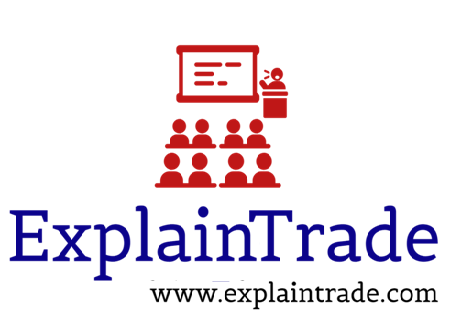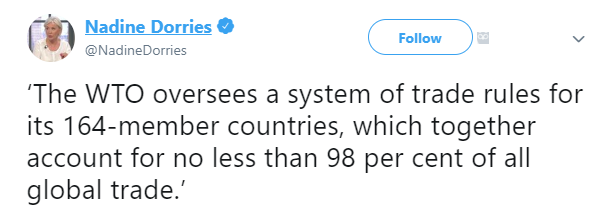A World Trade Deal, It Ain't
I loathe the term ‘World Trade Deal’ more than words can express. It is everything I hate about trade politics. It combines a pithy soundbite politicians with an agenda can deliver with confidence, with a layer of deception reliant on the complexity of trade to pass unchallenged on Sunday talk shows.
Take one look at this website and you’ll realize I’m not good at branding. I don’t have whatever gene it takes to look at a complete failure to agree mutually acceptable short-term arrangements with ones closest partners and think, “Success! World Trade Deal!”
Most branding is relatively harmless (until Supreme figures out a way to repackage air and hypebeasts all over the world start asphyxiating from refusing to breathe the basic stuff). The same is not true of positively spinning No-Deal as a ‘World Trade Deal’ which potentially lulls businesses and consumers into inadequate preparation for what will be a huge shock to the UK’s economy.
Re-branding to get ahead of Mad Cow Disease.
So, what’s the ‘No Deal = World Deal’ argument?
It runs like this: “In the absence of a negotiated Withdrawal Agreement with the European Union, UK-EU trade won’t become lawless. The rules of the World Trade Organization will continue to apply, a deal so good 164 countries are signed up to it!”
Referring to falling from the heights of the Single Market to the paltry safety net offered by baseline WTO commitments as a “World Trade Deal” is a brilliant piece of branding. It’s like if your mother threw you out and you re-branded ‘being homeless in Greater London’ as ‘living on a 1,583 square kilometer property with plenty of natural light.’
Unfortunately, it’s also largely (as you Brits say) bollocks.
Live shot of me, passing indistinguishably as a native wherever I go.
Why is it nonsense?
‘World Trade Deal’ manages something remarkable. Literally every word in it is either irrelevant, misleading or simply wrong. Let’s consider them one by one.
‘World’
The Brexit debate has seen a lot of different models emerge as possibilities:
The Norway Model
The Switzerland Model
Ukraine
Canada++++
The EFTA/EEA approach.
What all of these have in common is that they describe the UK replicating arrangements someone has with the European Union. So Canada++++ means taking the Canadian-EU FTA (CETA) and doing that, plus a few more elements.
This is because from a trade perspective, Brexit means the UK walking out of an advanced trade agreement with the EU (the Single Market). The biggest trade change will be in how the UK trades with Europe, and so the conversation was rightly focused on that.
To attempt to re-brand a failure to reach an agreement with the EU as some sort of global compact is absurd. The UK wasn’t negotiating with the rest of the world (except on some largely technical matters in the WTO and the more significant but still fairly niche Government Procurement Agreement). It was negotiating with the EU.
It’s also absurd to pretend that the world trades with the EU on WTO terms. Or rather, on only WTO terms, which is what a No-Deal would revert UK-EU trade to.
The EU is a trade agreement machine, relentlessly negotiating with half the planet. In addition to its existing FTAs and those it’s working on negotiating, it maintains a plethora of lower level agreements on everything from mutual standards recognition to investment protection. The ‘World’ doesn’t trade with the EU on only WTO-only terms, not even close.
No one at DG Trade has slept for decades. .
‘Trade’
You often hear claims like this one:
True but irrelevant, like if George Takei promised he’d never cheat on you with another woman.
The argument runs that since 98% of global trade is conducted between WTO Members and in line with WTO Rules, then reverting to them can’t be that big a deal. It’s cute, but manages to miss the point of both the WTO rules and the European Union Single Market.
The WTO Rules - Trade Disarmament
The best analogy I’ve come up with for the WTO rules is the Geneva Convention on Certain Conventional Weapons. This convention bans certain weapons of war like lasers which cause permanent blindness. States signed on to this convention not because they couldn’t come up with military uses for blinding lasers, but because they considered them bad enough to forego having access to them as long as everyone else did the same. War, they agreed, would be better without blinding lasers. They knew the temptation to use them would always be there, and moved to eliminate it.
The provision to also make ‘pew pew’ noises compulsory failed in sub-committee.
The agreements which form the WTO were created around the same basic principle. Governments recognized that using policies like tariffs, regulations and subsidies to mess with imports of goods and services would always be a temptation. They also recognized they couldn’t eliminate such measures all together. First, there are legitimate policy objectives to be achieved through such tools, and second, the political will to do so just wasn’t there (and isn’t now).
Instead, governments agreed to place certain limits on the types of policies they would use to mess with one another’s exports, and some upper limits on the messing. In time, they created the World Trade Organization to oversee these agreements and help resolve disputes or breaches in a systemic way.
Much as the Geneva Convention didn’t turn war into a fun happy event, the WTO only eliminates some of the distortions governments introduce into global markets. The Geneva Convention didn’t ban every horrific weapon, only the fairly short list governments could agree to at the time. Similarly, the WTO only eliminated or curtailed certain distortions.
Flamethrowers: Illegal to use on a forest… unless you think there are some enemy troops in it. I wish I were making that up.
The EU Single Market - Swords to Plowshares
Imagine you’re fighting your little brother. You want to settle your differences, because he clearly cheated in that last game of Mario Kart, but you also don’t want one of you getting maimed. Knives and weaponizing the family cat are probably excessive for a sibling squabble. You two are probably going to need some rules for your fight beyond just limiting the use of landmines and blinding-lasers. The Geneva Convention alone won’t cut it.
Trade often puts states in a similar position. There are measures they aren’t prepared to give up completely (by making commitments on them at the WTO to all its 164 Members), but are prepared to give up for specific partners in exchange for reciprocal promises. The WTO rules anticipate this, and allow Members to build on them with one another through trade agreements.
Such agreements vary wildly, from very specific Mutual Recognition Arrangements to giant deals like the CPTPP. The EU Single Market is the most advanced such agreement (a network of agreements, really) in the history of the world. It goes beyond simply eliminating barriers, to treating trade among its members as if it weren’t international at all.
If the WTO is the Geneva Convention, then the EU Single Market is limiting all conflict to pillow fights.
I did a Google image search for ‘Pillow Fight’ and now my girlfriend is mad at me. If she asks, this is definitely the image I was after.
Ok so…
So the trade which occurs under trade deals, while occurring under WTO rules (aka not violating them), also relies on arrangements which go far beyond just the WTO rules alone.
Whether losing access to the EU Single Market, or to the plethora of agreements the EU has negotiated on the UK’s behalf, a No-Deal scenario reverting the UK back to WTO rules would be a steep, steep drop indeed.
‘Deal’
It’s not a deal.
If two sides sit down at a table to negotiate something and agree literally nothing, their still being bound by the 1947 General Agreement on Tariffs and Trade does not make their failure a deal.
How does this need explaining?
If you rode your bicycle to the car dealership, haggled for a car and failed to agree a price, that’s not ‘bicycle deal’.
If you went on a Tinder date and they hated you, you haven’t ‘entered into a relationship’ even if your Pornhub Subscription is still valid and waiting for you at home.
Good enough for millions. Good enough for Britain.
It’s branding. My Axe/Lynx Body Spray didn’t make me cool either, why care?
Because painting No-Deal as anything other than a hand-grenade in the clockwork machinery of the UK’s trade is not only misleading, but actively dangerous.
Even if the fabled ‘managed No-Deal’ can materialize, putting in place the barebones bilateral cooperation agreements required to keep planes in the air, the consequences of No-Deal are grave:
The goods border between the UK and the EU goes from virtually non-existent to requiring all the bureaucracy, checks and payments of the EU’s border with the few countries with whom they have literally no legal arrangements with beyond the WTO;
The UK’s services access to Europe (the freedom to sell services remotely, to host EU clients, to establish offices in EU countries and to travel to the EU for work) snaps back from the best in the world to the incredibly limited access the EU offers countries its never done a deal with;
Precisely zero of the Free Trade Agreements the EU has negotiated appear ready to be rolled over on Brexit Day 1, meaning the UK will (at least temporarily) lose all the market access the EU has negotiated on its behalf;
The status of millions of British citizens in the EU and EU citizens in the UK will be in flux;
The EU has indicated it will immediately and retroactively cease accepting many UK certifications and tests, where its legislation requires testing by an EU body.
To unwind decades of trade and political integration overnight is a really big deal. The whole point of the Withdrawal Agreement was to buy the government more time to prepare for some of the issues above, and negotiate others.
This is really, really serious stuff. Businesses have to get ready.
Re-branding measles as ‘Super Happy Fun Lumps’ doesn’t make the disease less scary, it just drives down vaccination rates. Stop.
I am led to understand this is the Queen, so you have to obey.
If you enjoyed the above incoherent Brexit rant, you may also be interested in:
Buccaneering: Can Post-Brexit UK FTAs Secure the Booty?
UK WTO Schedules - What's going on now?
The Less You Know:Trade Negotiations, Secrecy and Brexit
Objections to the UK's WTO Schedule: What do they mean?









